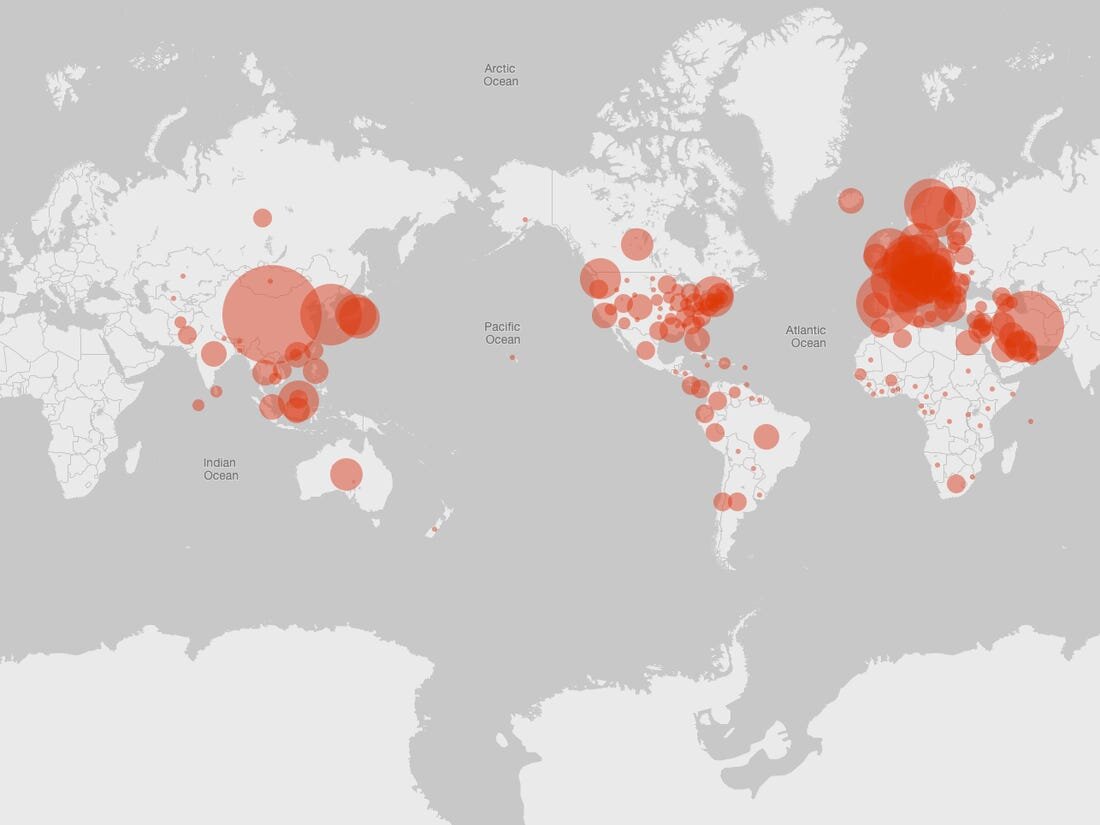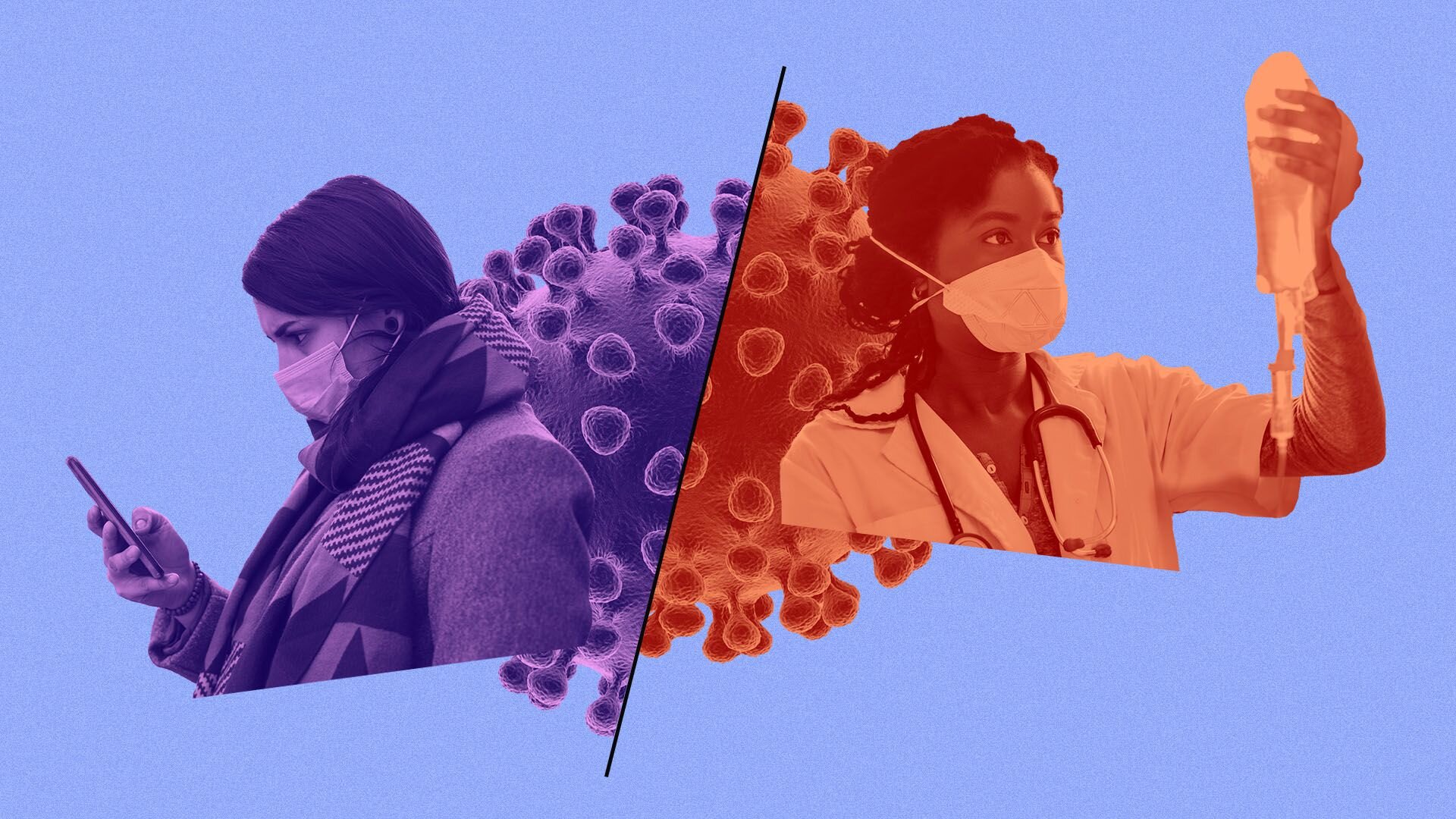COVID-19 is a highly infectious disease caused by the newly discovered strain of coronavirus, and, as of March 2020, has been labelled a global pandemic by the World Health Organization (WHO). Some of the symptoms include a runny nose, sore throat, cough, fever, and in severe cases, breathing difficulties. Less common symptoms, include loss of smell and taste and the COVID-Toes. Though this highly infectious virus has commonly been compared to the infamous influenza (flu), given its symptoms, there are reasons to believe that this pandemic could be more severe.
Though research is still being conducted, it is said that the novel coronavirus is significantly more contagious than influenza. With influenza, for every person that gets it, approximately between one and two other people can get the virus from the original victim. With COVID-19 on the other hand, approximately between two and three people can get the virus from the original infected victim. Furthermore, the incubation periods for influenza and COVID-19 differ drastically. With the former, the incubation period is on average around two days. With COVID-19, on the other hand, it could range from one to fourteen days. The infected victim could have the virus and might not realize it, thereby spreading it believing they are healthy. For these reasons, people are being self-quarantined, hospitals are being overrun, schools are being closed, and overall panic being spread throughout the world.
The virus is thought to spread primarily from person-to-person either due to individuals being in close contact with one another or due to droplets inhaled by a person when others near them cough or sneeze. These droplets can eventually land in one’s lungs. It is also possible for an individual to contact COVID-19 by touching a surface or object that has the virus on it and then touching their mouth, nose, or even their eyes. How a virus spreads from person-to-person varies depending upon the individuals.
It is believed that the coronavirus came from Wuhan, China and spread around the world, but the question is, how did it get to China? The answer to this question is still unclear but there have been some very plausible theories. The coronavirus has been compared to Sever Acute Respiratory Syndrome (SARS) - the disease that affected 26 countries, and resulted in more than 8,000 severe cases in 2003. It was said that SARS came from human contact with bats, whether due to consumption of the animal, or simply being in the same area. The same theory is being floated for the origin of the coronavirus. There is evidence to back up this theory. Both the coronavirus and SARS are diseases that evolved very quickly, and are confirmed to live in animals, frequently in bats. Moreover, when we come into contact with bats, we ingest their viruses into our body. Though this is still a theory, it is believed to be the most likely reason that the coronavirus infected humans.
There are ways to prevent getting the virus if you don’t yet have it. For starters you should wash your hands thoroughly, with soap, for 20 seconds (about as long as nursery rhyme “twinkle twinkle little star”). Washing your hands for all 20 seconds allows for most the germs to be washed off your hands, giving you the best chance of staying healthy. Another option is to use hand sanitizer, which kills all the bacteria off your hands making them clean and germ free. Unfortunately, hand sanitizer kills ALL the bacteria off your hands, even some of the good kind, and it does not kill viruses. So if you had a choice between washing your hands with soap, and using hand sanitizer, take the extra time to wash your hands. You should also try to stay at least six feet from all people as best as you can. The novel coronavirus spreads through respiratory droplets. Therefore, if you stand too close to someone who has it, you could get it by simply talking to them or by having them breathe on you. Researchers are suggesting that in some cases, the droplets can travel distances greater than six feet so even that distance may not be enough. You should also refrain from smoking and other activities that could weaken your lungs, as you (and especially your immune system) want to be as healthy as you possible. Finally you should practice physical/social distancing. This means avoiding unnecessary travel and staying away from large groups or crowds. The closer you are to these groups, the higher the chance you will catch the virus.
As of April 5th 2020, there are approximately 1.2 million active cases of coronavirus, 68,000 deaths due to the virus, and 260,000 people who have recovered from the virus. It is estimated that 75% of the United States will inevitably get the virus. Each day, these numbers are drastically increasing. We have health professionals working 24/7 around the world treating patients and trying to engineer solutions to this problem. However, there is a silver lining. Huge strides are being made and preventative medicines are being discovered. Though, as of March 2020, it was said that the earliest there will be a vaccine to this virus is mid 2021, this date has moved closer and closer due to advancements in the medical field. Furthermore, after thorough research, it has been said that COVID-19 has very little impact on children as well as young adults (symptoms will be similar to a cold, or at worse the flu). We have seen statistics showing 80% of coronavirus cases are mild to moderate — which ranges from having a fever and a cough to low-grade pneumonia.
Updated Dec. 30, 2020 On December 19 it was announced that a new strain of the coronavirus, known as “VUI — 202012/01”, was spreading in the United Kingdom. This particular strain spreads more easily. Based on modeling, British officials have said that that this mutation is anywhere from 55% to 70% more contagious. There is no evidence to-date that the strain causes a more intense illness or leads to a higher fatality rate, faster transmission does mean more cases, which can lead to a higher hospitalization rate. As of Christmas, the U.S. announced it was requiring all travelers from the U.K. to test negative within 72 hours of their departure.
On December 28, public-health officials in Colorado confirmed that the first case of the more transmissible strain had been found in the state. The infected person is a man in his 20s who does not have a recent travel history.
The good news is that this strain is not expected to be resistant to the current vaccines rolled out by Pfizer and Moderna.
Learn more about it HERE
Updated Jan 30, 2021 A more contagious strain of the coronavirus, first discovered in South Africa, has now been detected in the U.S. The director of the Centers for Disease Control and Prevention said Friday, January 19, 2021 that the South African Covid-19 variant, which was just detected in two people in South Carolina, had already reached the point of community spread in the U.S. The date that the South African variant was detected in the US is not necessarily the date that the virus reached the US shores. The US has lagged greatly behind other countries in tracking changes in the virus by sequencing its genetic code. Therefore the spread could have occurred a lot sooner. The variant -- also known as B.1.351 -- has raised concerns over being more transmissible than other versions of the virus, and potentially evading the immune protection offered by antibodies. South African researchers say they believe that the new variant is around 50% more contagious, based on the much faster rate of Covid-19 transmission since its emergence and biological studies of changes to the structure of the virus, which appear to make it easier for it to attach to and infect human cells. A concern for many people is the effectiveness of the current vaccines against the new strain. Scientists at Moderna Inc. and Pfizer Inc. have said that their respective vaccines appeared to be somewhat less powerful against the new strain in preliminary laboratory experiments, but that they still expect them to work. Novavax Inc. and Johnson & Johnson, whose vaccines have yet to be authorized, found that their shots were less effective in clinical trials in South Africa than in other countries where the new variant isn’t yet dominant, including the U.S. and the U.K. Learn more about it HERE and HERE and HERE
Updated Feb 17, 2021 A new coronavirus variant was found in Bristol, England. It may be able to infect people who have already had COVID-19 or who have been vaccinated. However, the vaccines will still protect against severe disease, experts have said. However, the efficacy of the vaccine will be reduced. It is similar to the variant found in South Africa. As of Feb. 11, there were 22 cases of this variant in England.
There is also another variant, called the Brazilan variant. This variant was first detected in Japan in a group of Brazilian travellers in January 2021. It’s now highly prevalent in the Brazilian state of Amazonas, and has been detected in countries including South Korea and the United States.While there’s no evidence this variant causes more severe disease, there’s concern it has facilitated a wave of reinfections in Manaus, the largest city in Amazonas, which was thought to have reached “herd immunity” in October last year.
Learn more about it HERE and HERE and HERE
Updated May 13, 2021 Viruses mutate all the time, producing different versions or variants of themselves. This is the reason we take flu shots annually - in order to protect ourselves from the latest variant. In India, one such variant - officially known as B.1.617 - was first detected in October. It is the fourth the WHO has declared a variant of global concern, along with the ones first identified in the United Kingdom, South Africa, and Brazil. As a result, many countries, including the United States, are restricting travel to and from India. The country is expected to go into a lockdown that could extend into June. Scientists do not yet know whether this variant is more infectious or resistant to vaccines. However, most scientists believe that the vaccinations now available are still likely to slow down the spread of the disease.Learn more about it HERE and HERE
Updated August 8, 2021 Viruses constantly mutate and change. This is the reason we take flu shots every year - to protect ourselves from new mutations. Some variants emerge and disappear. The COVID-19 virus is no different. The most important mutations are Alpha (UK), Beta (South Africa), Gamma (Japan/Brazil), and Delta (India). As of now, that last one is the one thought to spread the fastest and cause more severe illness. There is yet another variant, Lambda, that started in Peru and spread predominantly in South America. It is also considered to be highly transmissible and highly resistant to existing vaccines. The only ray of hope is that the variant may not gain as large a foothold as the delta variant. This is because the mutations have to compete against other mutations to become the dominant strain in a particular country. Since the delta variant is already predominant in the United States, it is going to be harder for the lambda variant to outplace it. The CDC recommends masking as a way to protect oneself from the Lambda variant.Learn more about it HERE and HERE
Updated August 30, 2021 The World Health Organization (WHO) listed the Mu strain of the coronavirus as a variant of interest. It was first documented in Columbia in January of this year. So far 49 states have detected this strain as have 40 countries including Brazil, Mexico, France and the UK. It is too early to tell if the current vaccines will be effective against this strain. Similarly, it is too early to say if it is more transmissible than the other strains. That said, the strain shares mutations with variants of concern, including the Delta variant which is currently dominating in the UK and USA. The symptoms of this strain are the same as those of others including high temperature, continuous cough and loss of smell or taste. Learn more about it HERE
Updated November 26, 2021 The World Health Organization said a newly identified coronavirus variant in southern Africa was deemed a “variant of concern”. This is a serious category as classified by the organization. A few dozen cases of the new variant, known as Omicron, have been identified in South Africa, Botswana, Belgium, Hong Kong, and Israel. There is no proof yet that the variant is more contagious or lethal, or how effective the existing vaccines will be against it. However, some of its mutations are concerning. The United States and Canada announced restrictions on travelers arriving from countries in southern Africa. Other governments that halted or restricted flights from South Africa included Bahrain, Belgium, Britain, Croatia, France, Germany, Israel, Italy, Japan, Malta, the Netherlands, Hong Kong, the Philippines, and Singapore. Learn more about it HERE and HERE
Updated March 20, 2022 A new variant of the coronavirus, exhibiting traits of both the Delta and Omicron variants, and aptly called Deltracron has been detected in various European countries since the beginning of this month. The countries include France, Denmark, Germany and the Netherlands. The good news is that this strain is relatively rare and does not exhibit the potential to grow exponentially. Learn more about it HERE
Updated July 14, 2022 The omicron subvariant of COVID-19, BA.5, has become one of the dominant strains of the virus in the U.S. It's the most easily spread strain to date and is able to evade immunity from COVID infection and vaccination. The symptoms like runny nose, cough, fever and sore throat are the same as the previous variants. The good news is that Omicron BA.5 is more likely to cause less severe illness compared to other variants. The bad news is that as more people get infected, the greater the likelihood for new variants to show up. The best way to protect oneself is by getting vaccinated. Learn more about it HERE
Updated October 17, 2022, A new Covid subvariant, called XBB and first detected in India in August 2022, spreading rapidly in Singapore. XBB is believed to be effective at evading human immunity systems, and is not impacted by a wide variety of established drug therapies and vaccines. The subvariant is reportedly more contagious than previous variants or subvariants and has spread to more than 17 countries, including Australia, Singapore, Denmark and Japan. Even though this subvariant is immune to vaccines, vaccines still protect people from extreme symptoms. Learn more about it HERE and HERE
“This is why it is important for us to stay alert, not anxious. Being too anxious could lead to panic, which could then lead to chaos; and we already know from the world’s past, that nothing gets done under chaos.”


















